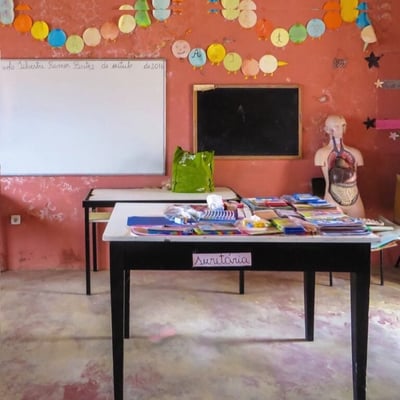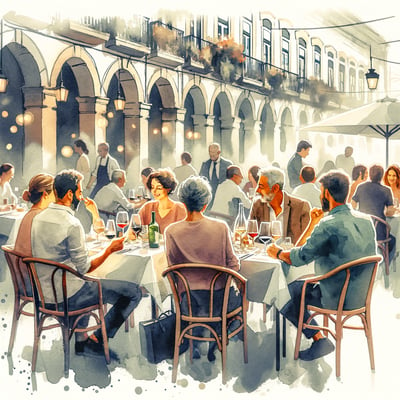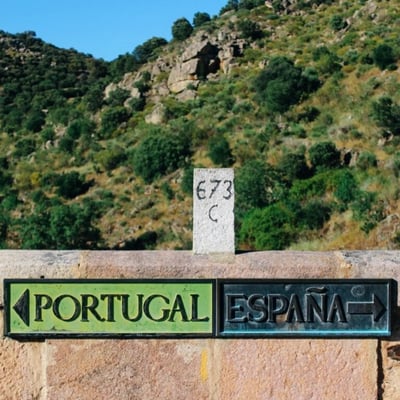1
00:00:02,025 –> 00:00:08,145
Pedro: Maria, eu e o João estamos a falar sobre profissões.
{{Pedro: Maria, João and I are talking about professions.}}
2
00:00:08,165 –> 00:00:11,965
Estamos a decidir o que queremos ser.
{{We are deciding what we want to be.}}
3
00:00:11,965 –> 00:00:19,465
Eu acho que tu podes ser muita coisa diferente, porque és boa em muitas coisas.
{{I think you can be many different things because you are good at many things.}}
4
00:00:19,465 –> 00:00:22,725
Mas o João acha que tens de escolher uma.
{{But João thinks you have to choose one.}}
5
00:00:22,725 –> 00:00:25,064
Que profissão escolhes?
{{What profession would you choose?}}
6
00:00:25,065 –> 00:00:27,065
Maria: Uma profissão?
{{Maria: A profession?}}
7
00:00:27,945 –> 00:00:34,625
Eu gosto de muitas… Eu falo muito em ser psicóloga, para ajudar pessoas, mas nós
{{I like a lot… I talk a lot about being a psychologist, to help people, but we}}
8
00:00:34,625 –> 00:00:39,305
podemos ajudar pessoas em muitas profissões, não acham?
{{can help people in many professions, don’t you think?}}
9
00:00:39,305 –> 00:00:41,265
João: Achamos, claro.
{{João: We think so, of course.}}
10
00:00:41,265 –> 00:00:46,365
Eu gosto de ciência e os cientistas ajudam muito as pessoas.
{{I like science and scientists help people a lot.}}
11
00:00:46,365 –> 00:00:48,565
Mas também gosto de escrever.
{{But I also like to write.}}
12
00:00:48,565 –> 00:00:51,445
Maria: Os escritores também podem ajudar.
{{Maria: Writers can also help.}}
13
00:00:51,445 –> 00:00:53,945
Tu escreves muito bem.
{{You write very well.}}
14
00:00:53,945 –> 00:00:57,185
Eu também posso ser médica, enfermeira…
{{I can also be a doctor, a nurse…}}
15
00:00:57,185 –> 00:00:59,015
Pedro: Ou bombeira!
{{Pedro: Or a firefighter!}}
16
00:00:59,015 –> 00:01:02,285
Maria: Todas as profissões ajudam, na verdade.
{{Maria: All the professions help, actually.}}
17
00:01:02,285 –> 00:01:11,865
Advogados, cozinheiros, polícias, cabeleireiros, empregados de mesa, músicos…
{{Lawyers, cooks, police officers, hairdressers, waiters, musicians…}}
18
00:01:11,865 –> 00:01:14,405
Todos fazem coisas úteis.
{{Everyone does useful things.}}
19
00:01:14,405 –> 00:01:16,945
Pedro: Sim, Maria, é verdade.
{{Pedro: Yes, Maria, it’s true.}}
20
00:01:16,945 –> 00:01:20,685
Incluindo a bibliotecária da escola.
{{Including the school librarian.}}
21
00:01:20,685 –> 00:01:23,305
Maria: Mas tu não gostas de ler livros!
{{Maria: But you do not like to read books!}}
22
00:01:23,305 –> 00:01:25,345
Pedro: Mas gosto da senhora.
{{Pedro: But I like the lady (the librarian).}}
23
00:01:25,355 –> 00:01:26,545
Maria: Que fofo.
{{Maria: How cute.}}
24
00:01:26,545 –> 00:01:32,285
Olhem, o meu pai diz que temos problemas nos canos de água de casa.
{{Look, my dad says we have trouble in the house’s water pipes.}}
25
00:01:32,285 –> 00:01:34,605
Sabem de quem precisamos agora?
{{Do you know who we need now?}}
26
00:01:34,645 –> 00:01:36,805
João: Um engenheiro?
{{João: An engineer?}}
27
00:01:36,845 –> 00:01:38,385
Maria: Engenheiro?
{{Maria: Engineer?}}
28
00:01:38,445 –> 00:01:39,945
Um canalizador!
{{A plumber!}}
29
00:01:39,945 –> 00:01:45,025
O meu pai conhece um canalizador muito bom e com muito trabalho.
{{My father knows a very good plumber with a lot of work.}}
30
00:01:45,025 –> 00:01:48,605
É isso, eu quero ser canalizadora.
{{That’s it, I want to be a plumber.}}
31
00:01:48,605 –> 00:01:51,725
João: Mas canalizador não é uma profissão de homem?
{{João: But isn’t a plumber a man’s profession?}}
32
00:01:51,825 –> 00:01:54,265
Maria: Profissão de homem??
{{Maria: A man’s profession??}}
33
00:01:54,265 –> 00:01:58,845
João estamos no século XXI, isso não existe.
{{João, we are in the 21st century, that does not exist.}}
34
00:01:58,845 –> 00:02:02,145
Uma mulher pode ser o que quiser.
{{A woman can be anything she wants.}}
35
00:02:02,145 –> 00:02:05,065
E eu quero ser canalizadora.
{{And I want to be a plumber.}}
36
00:02:05,065 –> 00:02:07,575
E rica se possível!
{{And rich if possible!}}
 We respect your privacy and have a ZERO TOLERANCE for spam.
We respect your privacy and have a ZERO TOLERANCE for spam.
















Thank you for the ‘Shorties’ they are perfect for a quick listen and completing the quiz too.
I love your site and listen often.
Marje
Teddington
This “shorty” was perfect timing for me today. I went to the hardware store with a “canalizador” question! What luck and I answered all the questions correctly. It’s sinking in!
Love a quick good audio featuring my sexy voiced boyfriend <3
I enjoy the “shorties”, especially the ability to slow down the dialogue to a variety of speeds helps with hearing the sounds,( though understaning the questions is tricky) and I need all the help I can get.
Is there any hope that you may, in the near future, be able to use your technical wizardry to have the same option available for the lessons?
It would also be helpful if the questions for each “shorties” was read out.
Thank you for all your hard work.
Thanks Terry, glad you’re getting a lot out of the Shorties. In the Lessons (and Learning Notes), if you click the turtle icon next to the speaker icon, it will play the audio more slowly. Not as many different options as the Shorties, but it helps. I’ll add your vote to having audio for questions to our suggestions list – it’s a good idea! We appreciate the feedback. 🙂
Olà. Há uma diferença entre as palavras “querer” e “quiser”?
Hi Matteus, Quiser comes from the verb querer – it is the futuro do conjuntivo (future subjunctive) conjugation of querer for both the 1st person and 3rd person singular. In the sentence Uma mulher pode ser o que quiser, it’s referring to a hypothetical future situation, so that’s why the conjuntivo is used. This is a more advanced topic, but good to be aware of. You will also hear quiser in phrases like: se quiser – if you want.
Olá, Wow, this is maybe the first time I didn’t even had to use the translation button. I’m impressed by what this old brain is still capable of. 😁
But there is something I still don’t quite get; In this sentence “Eu acho que tu podes ser muita coisa diferente, porque és boa em muitas coisas.”
In the first half Pedro says “muita coisa diferente” in a singular form. And after that he uses the plural. If Pedro were to say: ” tu podes ser muitas coisas diferentes”, would he be saying that Maria is going to be many things at the same time? (Like “Maria és boa em muitas coisas” has many skills.) And by using the singular form you imply that it will be only one of many things in the end?
Then there’s in the learning note on’ existential quantifiers’ the following sentence:
“isto ainda é muita coisa para levar.” (this is still a lot to carry). Is this also to bee seen as only one thing (burden) that is a lot to carry? And when you say: “isto são muitas coisas para levar” then there are many different individual things to be carried?
Am I close? Is there anywhere I can read more about this?
Well spotted! In informal speech, both the singular and plural forms of the quantifier “muito” are acceptable with countable nouns (muita coisa = muitas coisas), even when alternating in succession as in the sentence you mentioned. One could argue that the singular makes it sound a bit extra abstract/general, but I’d say that’s more up to individual interpretation than an intrinsic aspect of it. On the other hand, in formal speech or writing, we should only pair the singular “muito” with uncountable nouns, as expected.